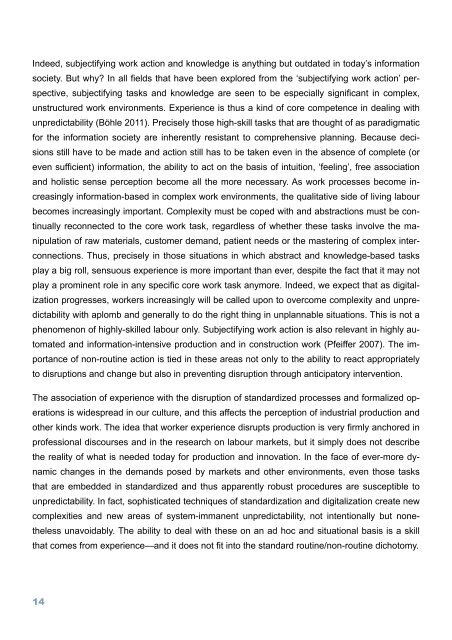DRAFT
237QXgQ
237QXgQ
You also want an ePaper? Increase the reach of your titles
YUMPU automatically turns print PDFs into web optimized ePapers that Google loves.
Indeed, subjectifying work action and knowledge is anything but outdated in today’s information<br />
society. But why? In all fields that have been explored from the ‘subjectifying work action’ perspective,<br />
subjectifying tasks and knowledge are seen to be especially significant in complex,<br />
unstructured work environments. Experience is thus a kind of core competence in dealing with<br />
unpredictability (Böhle 2011). Precisely those high-skill tasks that are thought of as paradigmatic<br />
for the information society are inherently resistant to comprehensive planning. Because decisions<br />
still have to be made and action still has to be taken even in the absence of complete (or<br />
even sufficient) information, the ability to act on the basis of intuition, ‘feeling’, free association<br />
and holistic sense perception become all the more necessary. As work processes become increasingly<br />
information-based in complex work environments, the qualitative side of living labour<br />
becomes increasingly important. Complexity must be coped with and abstractions must be continually<br />
reconnected to the core work task, regardless of whether these tasks involve the manipulation<br />
of raw materials, customer demand, patient needs or the mastering of complex interconnections.<br />
Thus, precisely in those situations in which abstract and knowledge-based tasks<br />
play a big roll, sensuous experience is more important than ever, despite the fact that it may not<br />
play a prominent role in any specific core work task anymore. Indeed, we expect that as digitalization<br />
progresses, workers increasingly will be called upon to overcome complexity and unpredictability<br />
with aplomb and generally to do the right thing in unplannable situations. This is not a<br />
phenomenon of highly-skilled labour only. Subjectifying work action is also relevant in highly automated<br />
and information-intensive production and in construction work (Pfeiffer 2007). The importance<br />
of non-routine action is tied in these areas not only to the ability to react appropriately<br />
to disruptions and change but also in preventing disruption through anticipatory intervention.<br />
The association of experience with the disruption of standardized processes and formalized operations<br />
is widespread in our culture, and this affects the perception of industrial production and<br />
other kinds work. The idea that worker experience disrupts production is very firmly anchored in<br />
professional discourses and in the research on labour markets, but it simply does not describe<br />
the reality of what is needed today for production and innovation. In the face of ever-more dynamic<br />
changes in the demands posed by markets and other environments, even those tasks<br />
that are embedded in standardized and thus apparently robust procedures are susceptible to<br />
unpredictability. In fact, sophisticated techniques of standardization and digitalization create new<br />
complexities and new areas of system-immanent unpredictability, not intentionally but nonetheless<br />
unavoidably. The ability to deal with these on an ad hoc and situational basis is a skill<br />
that comes from experience—and it does not fit into the standard routine/non-routine dichotomy.<br />
14


